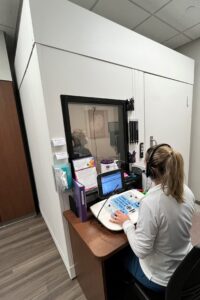Hearing loss is one of the most prevalent birth defects in the United States.
About 3 out of every 1,000 children in the United States are born with a detectable level of hearing loss in one or both ears, and 15 percent of American adults report some trouble hearing, according to the National Institute on Deafness and Other Communication Disorders.
Community Healthcare System offers an array of pediatric and adult audiology services.
The goal is to have a child’s hearing loss identified by 3 months of age and fit with amplification by 6 months, said Tricia O’Halloran, Community Healthcare System director for Audiology Services.
“We use a test battery, including Auditory Brainstem Response (ABR), Otoacoustic Emission (OAE) and tympanometry, to evaluate newborns and children to determine their level of hearing,” O’Halloran said.
Children who are fit with hearing aids between 6 and 9 months of age have a greater chance of staying on track with developmental milestones, including speech and language.

Community Healthcare System Audiology Services cares for patients from newborn to adult, which allows for continuum of care throughout their lifetime.
Adult patients may be more hesitant to seek assessment and often are encouraged to make an appointment by loved ones. In fact, many people wait an average of seven to 10 years before buying hearing aids after a hearing-loss diagnosis.
Hearing loss in adults may be caused by many factors, including aging, genetics, illness, injury, medications and noise exposure.
“In aging adults, hearing loss is associated with an increased rate of cognitive decline,” O’Halloran said. “Communication difficulties often lead to communication breakdown, which results in social and emotional isolation. Therefore, it’s important to continue to receive auditory stimulation to the cochlea (inner ear).”
Inconsistent auditory behavior, speech delay, ear infections and educational concerns frequently drive referrals for hearing assessment.
“Healthy hearing equals a healthy brain. Studies from Johns Hopkins University show a high correlation between dementia and hearing loss,” O’Halloran said. “There are a lot of studies that show patients who receive hearing aids also experience positive changes in the brain, which leads to improved quality of life.”
Community Healthcare System offers a range of audiology services, including hearing evaluations; hearing aids; Auditory Brainstem Response (ABR) tests; tinnitus assessment and treatment; cochlear implants; and Videonystagmography (VNG) testing, which measures involuntary eye movement.
Community Healthcare System recently expanded its audiology services to St. Mary Medical Center in Hobart.
“Community Healthcare System Audiology Services has a great team providing the highest level of comprehensive hearing healthcare in Northwest Indiana and the surrounding communities,” O’Halloran said. “We evaluate and treat each patient based on his or her individual goals and needs. And we continue to expand and grow, including adding cochlear implant services this past year. It’s an exciting time for my team. We love what we do.”
To learn more about Community Healthcare System Audiology Services, visit COMHS.org/services/audiology.

